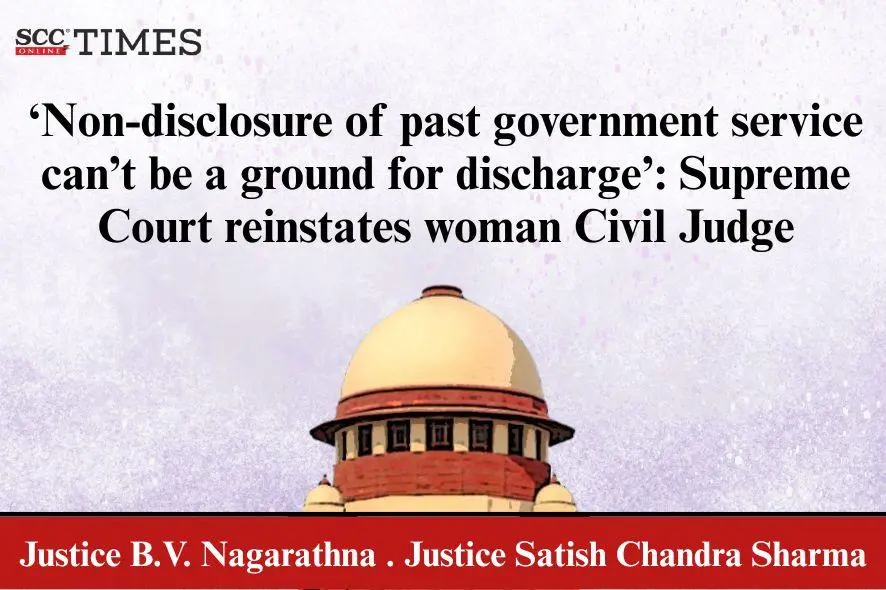Supreme Court: While deliberating over instant appeal whereby Rajasthan High Court dismissed a petition filed by the appellant challenging her discharge from Rajasthan Judicial Services (RJS); the Division Bench of B.V. Nagarathna and Satish Chandra Sharma*, JJ., set aside the order of discharge and directed the respondent to reinstate the appellant. The Court opined that non-disclosure of past government service, cannot be a ground to discharge the appellant.
While deciding the matter, the Court emphasised on the necessity of women’s participation in the judiciary and said that country will greatly benefit from a judicial force that is competent, committed and most importantly, diverse. The Court also commended the appellant for her perseverance by fighting societal stigmas and gaining a rich education that will ultimately benefit the judicial system and the democratic project.
Background:
The appellant was a degree holder in Bachelor of Arts, Bachelor of Education, Bachelor of Laws and Masters-in-Law, and was serving as Teacher Grade—II in the Education Department, Government of Rajasthan with effect from 30-12-2014.
In pursuance of an advertisement issued by Rajasthan High Court inviting applications for the post of Civil Judge and Judicial Magistrate on 18-11-2017, the appellant applied for the post and was subsequently selected. The appointment order was issued on 11-02-2019 and the appellant joined as a trainee RJS on 06-03-2019 and completed her training successfully on 07-03-2020. Vide order dated 06-03-2020, the appellant was kept under Awaiting Posting Order (“APO”) and later her headquarter was changed from Jodhpur to District and Sessions Judge, Jaipur Metro.
Certain allegations were made against the appellant via complaints. It was alleged that the appellant while in service of the Education Department of the State of Rajasthan obtained LL. B. and B. Ed degree in the same year; obtained LL. M. degree while being in service as a teacher showing her attendance as a regular student, and did not obtain permission from the employer while participating in the RJS examination meaning thereby No Objection Certification was not obtained by her from the State Government. It was also alleged that the appellant concealed her resignation from government service while joining as a Civil Judge.
In pursuance of the afore-stated allegations against the appellant, a notice was issued to her on 17-02-2020 directing her to furnish a pointwise explanation to certain queries raised by the High Court and a reply was submitted by her on 02-03-2020. The show cause notice was issued under Rule 16 of the Rajasthan Civil Services (Classification, Control and Appeal) Rules, 1958. An Inquiry Report was also submitted before the Full Court of the High Court. The Full Court upon perusal of the reports, decided to discharge the appellant as she was a probationer and no certificate in respect of completion of probation period was issued by the High Court.
The appellant challenged the show cause notice and discharge order before the Rajasthan High Court, which was rejected. Aggrieved, the appellant hence approached the Supreme Court.
Contentions:
Counsel for the appellant argued that allegation in respect of completing LL. B and B. Ed courses together is concerned, misconduct, if any, was committed by the appellant while serving the Education Department and not while on probation in the judicial service, but the Education Department has not taken any action in the matter and the same cannot be a ground to discharge her as a Civil Judge. It was argued that the appellant belongs to a tribal community and has proved her worth by clearing the RJS examination, hence, no purpose is going to be served by throwing her out especially when she has completed her training with flying colours.
Per contra, the respondents contended that the appellant has pursued B. Ed and LL. B degree simultaneously, which is not permissible as per Ordinance 168-A and Ordinance 168-B of the Handbook of University of Rajasthan and, therefore, the appellant had misconducted herself. The respondents stated that a fact-finding report was prepared by the Registrar (Vigilance) after seeking an explanation from the appellant and the allegations levelled in the show cause notice were established in the inquiry report. The respondents further stated that the appellant failed to disclose her earlier status of a government teacher in the application form and, therefore, the Full Court was justified in passing a resolution to discontinue her services and consequently, the order of discharge was issued in the matter.
Court’s Assessment:
Upon perusing the facts of the case, contentions raised in the matter and the impugned show cause notice the Court pointed out that the bare perusal of the show cause notice establishes that misconduct, if any, in respect of obtaining LL. B and B. Ed degree simultaneously relates to the service period prior to being a Judicial Officer. Similarly, in respect of LL.M. degree, the appellant was not a Judicial Officer and was serving as a Teacher Grade-II in the Education Department of Government of Rajasthan.
As far as the allegation regarding suppression of material information regarding past government service, the appellant submitted resignation on 25-10-2018 from the post of Teacher Grade-II and on the date of interview i.e. on 02-11-2018, she was required to furnish certain information as per the check list and it was a fact that on the date of interview, appellant was no longer a government servant as she had resigned and in those circumstances, there was certainly an omission on the part of the appellant in not mentioning about her past record of government service.
However, the Court opined that as the appellant had submitted her resignation much prior to her interview, the question of disclosing the past government service is certainly not a material irregularity or a serious misconduct for which she ought to be discharged from service especially when the appellant successfully completed her training without any blemish. Furthermore, the appellant was suffering from lymphadenopathy tuberculosis since March 2018, and was admitted to the hospital on and off and, therefore, the alleged suppression should not come in her way leading to discharge from service.
“This is certainly not a case where the appellant has suppressed criminal antecedents, which may materially affect her commitment to the judiciary”.
The Court noted that the appellant did not submit any NOC, which was appropriately explained by her and the Enquiry Officer, that at the relevant time, the appellant had already resigned. Therefore, non-disclosure of previous government service could not have become a ground to discharge the appellant.
Perusing the relevant Rules of Rajasthan Judicial Service Rules, the Court pointed out that it was nobody’s case that the appellant’s performance during the probationary period was unsatisfactory. “In fact, she has successfully completed her training with flying colours and, therefore, by no stretch of imagination could her services be put to an end in the manner and method it has been done by the respondents”.
The Court further said that in the instant case, it can be held that there was an omission on the part of the appellant in informing the employer about her past government service. Further, a reasonable explanation has also been provided by the appellant regarding her past government service, therefore, in those circumstance, she was not required to mention the same.
“In the considered opinion of this Court, the appellant has been awarded capital punishment for a minor irregularity (omission)”.
The Court pointed out that the order discharging the appellant from service violates principles of natural justice, as the appellant was not provided an opportunity to be heard during the enquiry that was required to be conducted.
Participation of Women in Judiciary:
Perusing the matter, the Court deemed it fit to touch upon the issue of representation of women in judicial services. The Court stated that to holistically understand women’s effective participation in the Judiciary, it is important to look at three main phenomena: (I) the entry of women into the legal profession; (II) the retention of women and growth of their numbers in the profession; and (III) the advancement of women, in numbers, to senior echelons of the profession.
The Court pointed out that advancing women’s greater participation in the judiciary also plays a role in promoting gender equality in broader ways. Increased diversity within a judiciary, and ensuring judges are representative of society, enables the judiciary as a whole to better respond to diverse social and individual contexts and experiences. “It is a recognition of this fact that a greater representation of women in the judiciary, would greatly improve the overall quality of judicial decision making and this impacts generally and also specifically in cases affecting women”.
a. Female judicial appointments, particularly at senior levels, can shift gender stereotypes, thereby changing attitudes and perceptions as to appropriate roles of men and women.
b. Women’s visibility as judicial officers can pave the way for women’s greater representation in other decision-making positions, such as in legislative and executive branches of government.
c. Higher numbers, and greater visibility, of women judges can increase the willingness of women to seek justice and enforce their rights through the courts.
Decision:
-
With the afore-stated assessment and commending the appellant’s perseverance, the Court opined that in the peculiar facts and circumstances of the case that the impugned show cause notice as well as the order of discharge deserve to be set aside and are accordingly set aside.
-
Therefore, the Court allowed the appeal and quashed the show cause notice dated 17-02-2020 and the discharge order dated 29-05-2020.
-
It was held that the appellant shall be entitled to reinstatement in service forthwith with all consequential benefits, including, fixation of seniority as per the merit list in the examination in question, notional fixation of pay, except back wages.
-
It was further clarified that the respondent must treat the appellant as to have successfully completed her probation period and the appellant shall be treated as a confirmed employee.
CASE DETAILS
|
Citation: Appellants : Respondents : |
Advocates who appeared in this case For Petitioner(s): For Respondent(s): |
CORAM :




